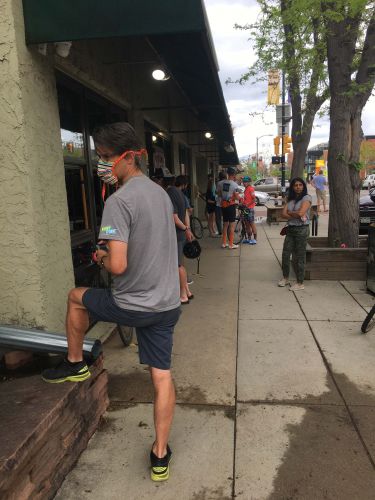HATTIESBURG, Miss. (BRAIN) — With careful consideration of staff and customer health, many bike retailers are wrestling with the safe way to reopen to foot traffic after shelter-in-place orders lift in the wake of COVID-19.
"We're erring on the side of caution as we have a 15-month-old staying with us as his daycare has closed; one employee's mom just had brain surgery and her immune system is compromised; my dad is in his 80s; and at age 63 in our state, I have an 8% chance of dying if I become infected with this virus," said James Moore of Moore's Bike Shop.
He considered opening a small section of his store to customers to create a "boutique look."
"That area has its own outside entrance as it once was a separate business and has its own AC system, so air there will not mix with air in our main showroom area where we're also doing assemblies and repairs," said Moore, who in recent months has conducted all business in the parking lot with a weather-proof service writing area.
Despite that well-thought-out plan, Moore won't reopen for foot traffic any time soon, citing the steady COVID-19 death rates in Mississippi.
"Even though restrictions have been lifted to a degree and some local restaurants are again seating folks inside, I've noticed that few if any of the national chain restaurants have returned to inside dining," Moore said. "I don't think it's due to a lack of staff with the large unemployment numbers now. I think their top brains are telling them it's just too early from a safety and liability standpoint. We'll be watching the chains and will not make a move to letting folks in until we see the restaurant chains do so."
Jim Hogan, owner and founder Geneva Bicycle Center in Geneva, New York, said his shop is too busy to invite a limited number of customers inside. His plan would be to schedule appointments for one or two customers at a time but doesn't have enough staff to execute.
"All day long, every staff member is juggling so many customers and duties that we can't spare any one of us for a 30-minute appointment," said Hogan, who added he's been operating curbside. "Hopefully, soon, we'll be able to allow masked customers in, have them sanitize/wash their hands, and have them avoid touching items except when handed by a staff member. I'm a few months from my 25th anniversary owning the store. If you told me this would be how we would mark that milestone ..."
B&L Bicycles in Pullman, Washington, allows customers only a few feet inside, with staff bringing products to them. Owner Brice Erickson split his staff into two teams, one covering Monday-Wednesday, the other Thursday-Saturday.
"There were reasons for this approach," Erickson said. "One, social distancing in a 1,900-square-foot store. To keep more personal space, you have to reduce the number of bodies. Two, if someone on the staff gets COVID, you only take down part of the staff in quarantine, so we could still operate with the other team. The data on virus transmission backs this approach."
Erickson said he and his staff work before and after hours to improve workflow, with two staff members having off-site assembly workshops to perform bike builds.
"To operate this way is a huge pain in the neck," he said. "Most customers are understanding, and some are clueless. However, the science behind this approach really reduces the risk of a staff member getting COVID, at least at work, which from my perspective, is a big deal as much of my staff is long term. So we care about each other, and if a store gets an outbreak, nothing good will happen."
John Robinson of Johnny Velo Bikes in Columbus, Ohio, said he has continued to monitor and amend in-store procedures. No more than two sales staff are on the floor at a time, with each taking two customers, and masks are required for everyone.
"We've managed to secure a supply of disposable masks and are happy to provide them when customers enter if they don't have one," Robinson said. "Our staff is also wearing masks. If people are unable to wear a mask, we are also happy to serve them outside on our patio."
Robinson said he's in the at-risk population for COVID-19 as a two-time cancer survivor, and employs staff also considered at-risk, "so my tolerance for anyone not following our rules is not very high," he said.
His shop also features a sanitizing station a few feet into the entrance, with customers asked to sanitize before coming in. Customers bringing in bikes for service also are asked to sanitize their bikes with provided sanitizer. No cash transactions are accepted.
"For the most part, we have only had a few people that didn't want to follow our procedures, and we have agreed that we will accommodate them outside, or if they choose, they may leave because my staff's health and my customer's safety isn't worth someone's money," Robinson said.


